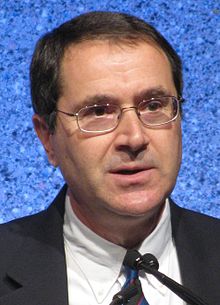- David Galenson
-
David W. Galenson (born 1951) is a professor in the Department of Economics and the College at the University of Chicago, and a Research Associate of the National Bureau of Economic Research. He has been a visiting professor at the California Institute of Technology, Massachusetts Institute of Technology, the University of Texas at Austin, the École des Hautes Études en Sciences Sociales in Paris, and the American University of Paris. He is the Academic Director of the Center for Creativity Economics, which was inaugurated in 2010 at the Universidad del CEMA, Buenos Aires.[1]
He is the son of economists Marjorie and Walter Galenson.[2] He attended Phillips Academy.[3] He then studied at Harvard University for both his undergraduate and graduate education, completing his PhD in 1979.
Galenson has become famous for postulating a new theory of artistic creativity. Based on a study of the ages at which various innovative artists made their greatest contributions to the field, Galenson's theory divides all artists into two classes: Conceptualists, who make radical innovations in their field at a very early age; and Experimentalists, whose innovations develop slowly over a long period of experimentation and refinement.
Although Galenson initially developed his theory from data solely concerning the visual arts, he has since also investigated conceptual and experimental innovators among poets, novelists, film makers, popular musicians and economists.[4]
Among the examples Galenson cites of conceptualists are:
- F. Scott Fitzgerald, who wrote The Great Gatsby at 29.
- Pablo Picasso, who painted Les Demoiselles d'Avignon at 26.
- Orson Welles, who made Citizen Kane at 26.
Among the examples he gives of experimentalists are:
- Mark Twain, who wrote Adventures of Huckleberry Finn at 50.
- Alfred Hitchcock, who made Vertigo at 59.[5]
In 2008, he was awarded a Guggenheim Fellowship in fine arts research.
Comics theorist Scott McCloud seems to have anticipated some aspects of Galenson's theory in his 1993 book Understanding Comics.
Publications
- White Servitude in Colonial America: An Economic Analysis, Cambridge University Press, 1984.
- Traders, Planters, and Slaves: Market Behavior in Early English America, Cambridge University Press, 1986.
- Painting Outside the Lines: Patterns of Creativity in Modern Art, Harvard University Press, 2002.
- Artistic Capital, Routledge, 2006.
- Old Masters and Young Geniuses: The Two Life Cycles of Artistic Creativity, Princeton University Press, 2007.
- Conceptual Revolutions in Twentieth-Century Art, Cambridge University Press, 2009.
Footnotes
- ^ http://www.davidgalenson.com
- ^ Galenson, David W. White Servitude in Colonial America
- ^ http://pdf.phillipian.net/1968/03061968.pdf
- ^ Pink, Daniel H. "What Kind of Genius are You?" Wired . 148-53,166.
- ^ Pink, Daniel H. "What Kind of Genius are You?" Wired . 152-53.
External links
- David Galenson's homepage
- Article about him in Wired
- Faculty page at University of Chicago's Department of Economics
- University of Chicago Experts Guide
- Arts of Innovation, which applies Galenson's approach to innovation in business, science, invention and daily life.
Categories:- 1951 births
- American economists
- Harvard University alumni
- University of Texas at Austin faculty
- University of Chicago faculty
- Living people
- Guggenheim Fellows
- American economist stubs
Wikimedia Foundation. 2010.

